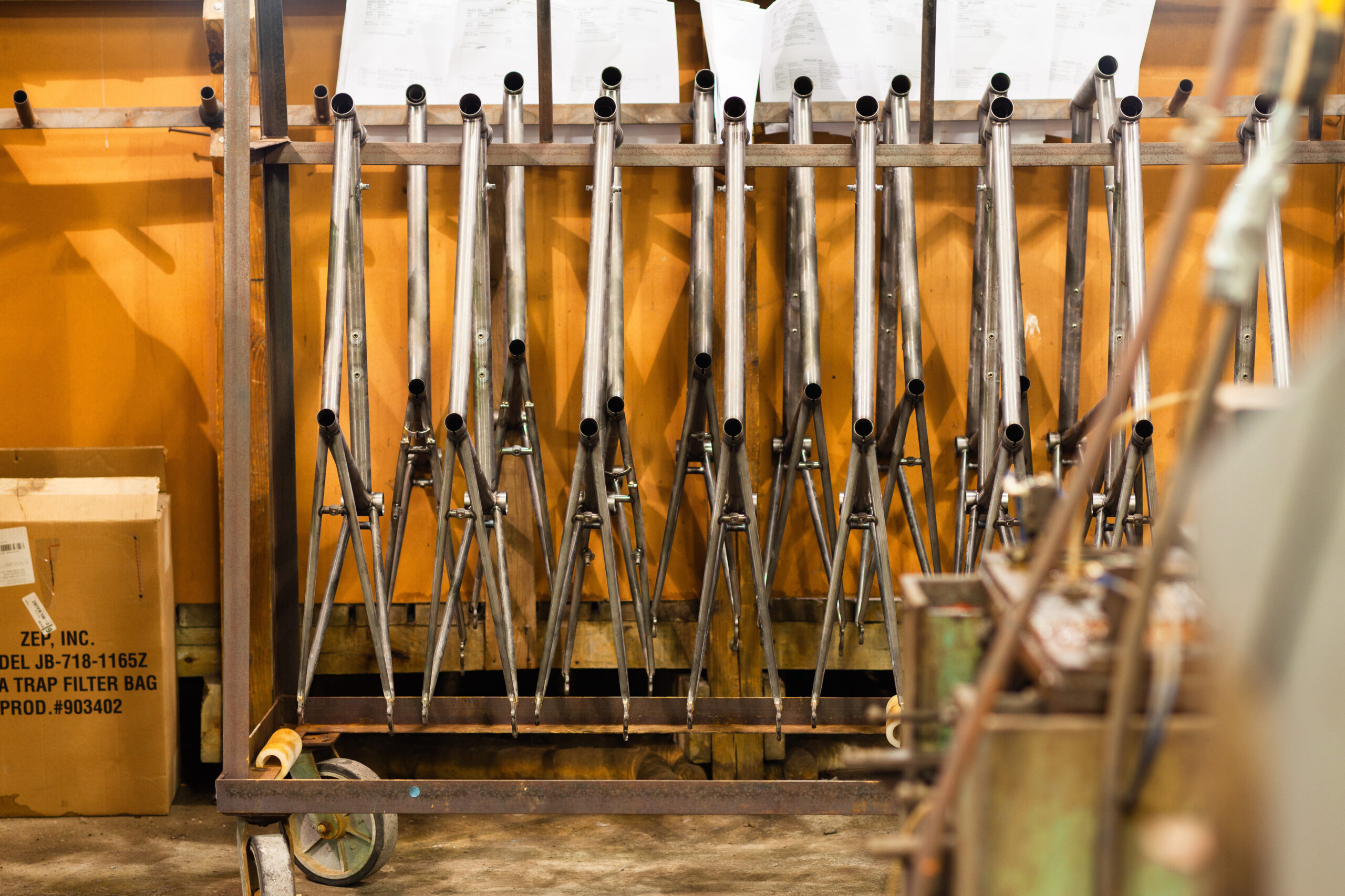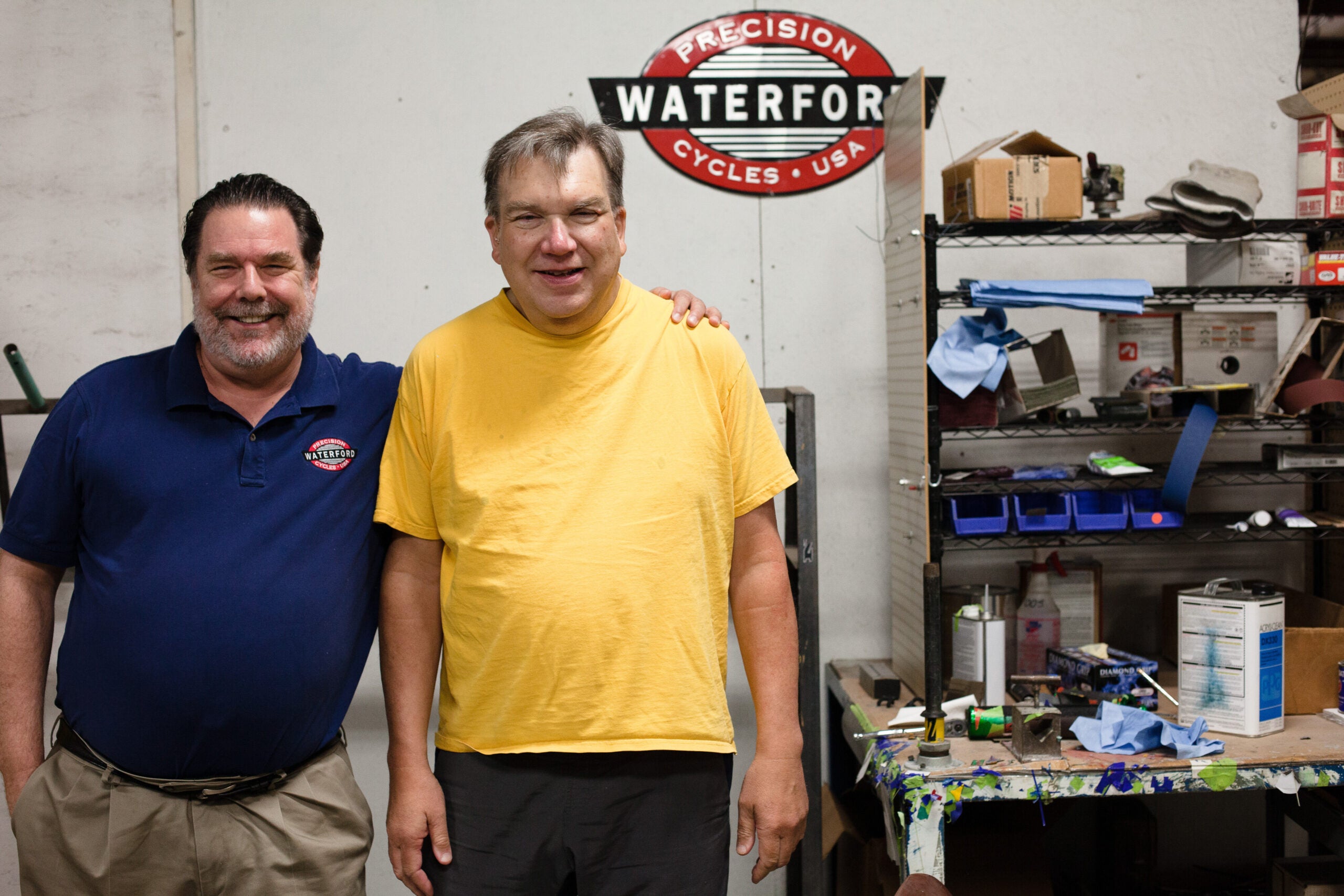For more than 130 years, the Schwinn name has been synonymous with bicycles. This is still true almost 30 years after bankruptcy ended the Schwinn family’s ownership of the brand.
The original factory in Chicago that once employed as many as 2,000 people is long gone. The Schwinn brand is now owned by a Dutch conglomerate that manufactures bikes overseas and sells them to big box stores such as Target and Walmart.
However, one member of the Schwinn family remained at the helm of a U.S. bike company. Richard Schwinn ran Waterford Precision Cycles out of the same plant in southeastern Wisconsin previously owned by his family.
News with a little more humanity
WPR’s “Wisconsin Today” newsletter keeps you connected to the state you love without feeling overwhelmed. No paywall. No agenda. No corporate filter.
But no longer.
“The streak is over,” Richard Schwinn said during a recent appearance on Wisconsin Public Radio’s “The Morning Show.”
Schwinn referred to the bike-building business his great-grandfather, Ignaz Schwinn, started in the 1880s “as a long streak.”
A streak he ended in June.
That’s when Waterford shipped out its last bikes. The manufacturing equipment and the building were sold and the last remaining seven employees were laid off, each with a “little severance,” Schwinn said.
“People ask if I’m grieving,” Schwinn said. “But the point of our business was not to keep the streak going. The point of our business has been to serve our customers. And I’m proud of the work we’ve done through the years.”
“But for a while every so often I’d go, ‘Oh, the streak’s going to be over. I’m going to be the one that stops it.’ But then I’d think, ‘Wait a minute here. I kept that streak going for 30 years.’ So I’m done apologizing for it, let’s put it that way,” he said.

Out of the Schwinn bankruptcy in the 1990s, Richard Schwinn and business partner Marc Muller emerged with the factory in Waterford but not the legal right to do business under the Schwinn name.
He opened Waterford Precision Cycles and briefly renewed production of the highly-prized Schwinn Paramount road racing bikes built there. Waterford Precision would continue to hand build a couple of thousand custom, steel frame bikes a year under the Waterford and Gunnar brands, as well as for other small bike companies.
“The bikes that we were building are not available from larger scale manufacturers,” he said. “It used to be a lot of the mass production competition was right here in the United States — (manufacturers) like Huffy and Murray. In 1995, when we liberalized trade with China, they were the immediate victims of that and had to reorganize. But bicycles benefit very much from economies of scale. And that is just a reality.”
By 1992, when the Schwinn Bicycle Company went into bankruptcy, the manufacturing of its bicycles had moved almost entirely overseas, primarily to Asia. That’s still the case for Schwinn-branded bikes sold in the United States.
The ownership of Schwinn-branded bikes has changed hands several times. In October 2021, a privately-held Dutch group called Pon Holdings bought Dorel Sports from Dorel Industries, the parent company for Schwinn, Cannondale, GT and Mongoose. The deal included acquisition of Pacific Cycle, which still manages the Schwinn brand and others from its headquarters in Madison.
Richard Schwinn said bicycle manufacturing isn’t and has never been a large enough industry in the U.S. to warrant government protection or subsidies like the automobile industry.
“Even if we built every bicycle in this country, you would probably build them with less than 10,000 people. And that’s not nearly as strategic as the automobile industry, which employs half a million people,” Schwinn said.
Nevertheless, building bikes “has long been the stepping stone to industrialization” by other nations, he said. “If you want to learn how to build cars, you had to start by building bikes. If you wanted to learn how to build aircraft, you start by building bikes.”
After World War II, for example, Japan rebuilt its economy in part by building bicycles, Schwinn said. Bike manufacturers in Taiwan and China also found the skills they developed were applicable in other industries.
In the United States, however, bike companies had to find bike buyers outside the mass market dominated by bikes made in Asia. American and European makers geared their bikes for competitive riders, such as triathletes and other road racers.
“But those aren’t necessarily bikes that are ridable by a lot of people,” Schwinn said. “We’ve long been a proponent of what we call broad-spectrum bikes — bikes that are not so narrowly focused.”
In the 1980s, Waterford Precision started building cyclocross bikes. They are similar to the gravel bikes popular today, which also handle well on a range of surfaces.
Schwinn said he didn’t shutter his company because demand for high-quality craftsmanship has dried up. He said the main reason was that three of his seven employees were at or nearing retirement age, including himself at 69.
He said he was proud of how his team came together “when it was time to put Waterford to bed.”
“Everybody kept their heads down and kept working towards this goal of getting every last bike out the door,” he said. “Even though we’ve stopped building bikes, our bikes are going to be ridden long past my path to the grave.”
Wisconsin Public Radio, © Copyright 2026, Board of Regents of the University of Wisconsin System and Wisconsin Educational Communications Board.


